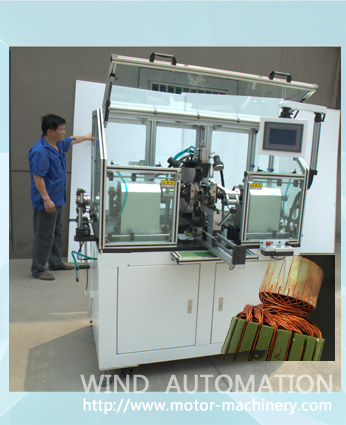Typically, a winding machine winds a material, such as metal wire(enamel copper wire or aluminum wire), thread or paper onto a core, spool,frame or bobbin.
Coils of copper wire, which are known as windings.
The purpose of these windings is to create a magnetic field when a current is run through them
There are several different types of winding machines, from simple manual feed machines to complex computer-numeric-control (CNC) machines. Some of the more common uses for winding machines are coil winding, rope winding, and continuous winding. Many industries use these devices, including textile, electronics,stator,rotor and armature of motor production and wire industries.
A manual winding machine usually has a core on a spindle and the user feeds wire, rope, or other material onto the core. The user controls the spindle speed and feeds the material through his or her hand, guiding it to control the tension and load pattern. These simple machines may be of a bench-top size or large stand-alone winders.
For example,Wind automation have a manually armature winding machine for repairing with demo video
Most winding machines are CNC controlled or are a combination of manual and automatic. The CNC controls can regulate the tension of the material, the amount that is wound on the base, and the pattern in which the material is wound onto the base. For example, the machine will not stretch knitting yarn, which ruins the yarn. Although they are similar, winding machines are different from reeling machines that wind hanks of yarn.
The textile industry has several uses for winding machines. The most common is thread winding, which may involve winding the thread onto a card, bobbin, or spool. Other materials that need a winding machine include ribbons, yarns, and cords. Sometimes companies combine the winding machine with another machine, such as a twister, to spool a product like rope.
One of the first uses for a continuous filament-winding machine was for the aerospace industry. A continuous filament winder applies a continuous, resin-impregnated fiber in a precise pattern. The industry used the resulting product for missile nose cones, casings, and other missile parts. Manufacturers use the continuous filament process for many different products, including bicycle parts, golf clubs, and military equipment.
In the paper industry, these machines wind freshly made paper sheets into very large rolls that may weigh up to 40 tons (36.3 metric tons). These rolls are too big to handle and ship to customers, so manufacturers use winding machines to convert the huge sheets of paper into manageable rolls. Usually, the company makes the rolls to the customer's specifications. Sometimes the customer rewinds the product onto rolls small enough to sell to consumers, such as gift wrap, wax paper, and paper towels. Shanghai Wind Automation have some machines to divide this kind of insulation material to needed size check the video on dailymotion http://www.dailymotion.com/video/x29bxex_insulation-material-paper-material-devided-machine_tech
Motors usually contain armature and stator, which are copper wire wound around a core. Manufacturers use manual, automatic, or CNC-controlled winding machines to make stators. Wire winding is useful in the electronics industry and in making step-up or step-down transformers. The stators and similar items may be solid core-based or toroidal-based, meaning they have a doughnut-shaped base with a hole in the center. Some machines can wind either style, but most winders do either one or the other.
The armature winding is the main current-carrying winding in which the electromotive force or counter-emf of rotation is induced. The current in the armature winding is known as the armature current. The location of the winding depends upon the type of machine. The armature windings of dc motors are located on the rotor, since they must operate in union with the commutator. In DC rotating machines other than brushless DC machines, it is usually rotating.
Contact: Shanghai Wind Automation Equipment Co.,Ltd emily@motor-machinery.com
Skype: motor.machinery
Mobile: +86-18067425780
Website: http://www.motor-machinery.com; http://www.coilswinding.com



 Pearl
Pearl Emily
Emily